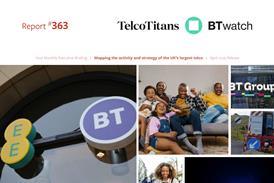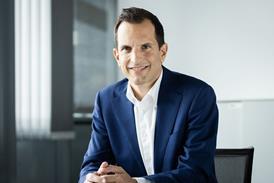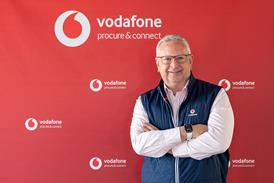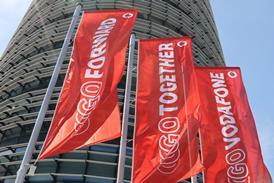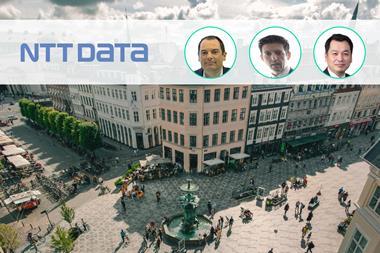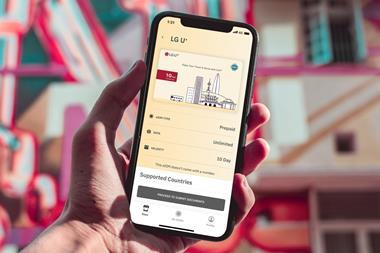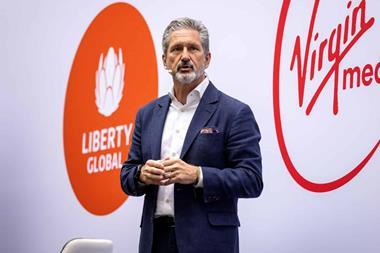- As the telecoms industry makes meaningful progress on digital transformation, the sector has opened up to more partnership and service possibilities, with AWS’s major engagement at MWC underlining its key role in the evolving sector.
- At a conference where generative AI was the dominant theme, AWS emphasised its embrace of the technology, with use cases showing telco benefits already in play.
- Network‑as‑a‑Service emerged as a resounding hope for the future, and the cloud platform provider offered up its experience in developer relationships as showing the way for network APIs. Telco CTO Ishwar Parulkar urged operators to be brave, and move faster.
- With 5G monetisation showing signs of gaining traction, AWS is focusing on key industries that can unlock telco opportunities, bringing ISVs and operators together to create tangible value through collaborative solutions.
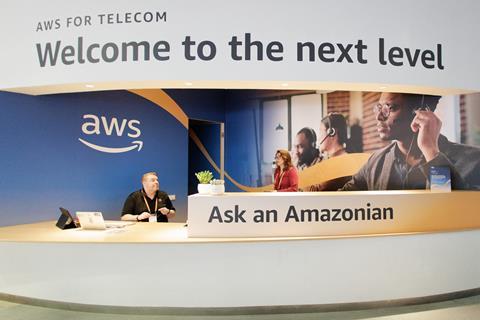
Special Report by TelcoTitans, in collaboration with AWS.
If Mobile World Congress can be considered a microcosm of the telecoms sector, then the 2024 iteration vividly illustrated the fundamental changes taking place in the industry.
Of the 100,000-plus attendees, the GSMA indicated that almost 60% were from industries adjacent to the core mobile sector, reflecting the shift towards mobile networks becoming an entwined element of digital services all kinds, and not simply a domain of communications providers. Decisionmakers were out in force too, with more than half of attendees said to be director level or above, and 21% C‑Suite.
With generative AI permeating seemingly every activity and conversation, the feel was almost more tech than telco.
This was a truly global event, with players from the Middle East, Africa, Asia and the Americas all with a highly visible presence, reflecting perhaps a re-convergence of the industry for a new age of network and technology optionality and collaboration (such as open RAN and cloud AI) and TechCo.
The numerous opportunities and challenges driving this growth in cross‑continent and inter-industry collaboration include monetising 5G, embracing generative AI, adopting platform and partner models, re-igniting growth, assimilating the data economy, technology and business model reinvention, and navigating macro trends.
The future for operators presents considerable opportunities for the shift to new revenue streams, and openings for the vital position of trusted partner for digital traffic.
AWS into the crucible — to accelerate transformation, monetisation
Amazon Web Services is making a concerted play to be a guide, partner and facilitator of this new telecoms reality.
The cloud giant’s commitment to the sector was evident in the resources it brought to the event, with around 200 ‘Amazonians’ on the ground, and with hundreds of demos, presentations and meetings supporting dozens of use cases and partnership announcements tied in with the conference.
Taking over a swathe of prime real estate above the southern entrance to the Fira, the message was that AWS is intent on using its skills and experience to bring operators to the next level.
The AWS perspective was widely shared across presentations and panel discussions across the event, including being namechecked as a partner by operators and other players explaining their own strategic plans for adapting to an AI and cloud network environment, and for unlocking the benefits of 5G.
And progress is seen coming fast: “This is such an exciting time in our industry”, said Chivas Nambiar, AWS’s General Manager for Telco Business, comparing the current pace of change in telecoms to that seen at the start of the seismic public cloud transformation. With AWS in telco for the long‑haul, he also noted that “What we’re finding is, our customers who are working with us to get something started, start to see the value of it very quickly”.

The AWS presence even reached beyond the bounds of Earth, with Director for Space & Satellite Clint Crosier discussing on stage how AWS’s work on AI and advanced data analytics has helped lower barriers to entry on space exploration. Speaking as part of a forward‑looking panel on the future of public‑private space missions, he raised the prospect of cloud networks on the Moon and Mars, along with the benefits that non‑terrestrial networks bring to those on Earth.
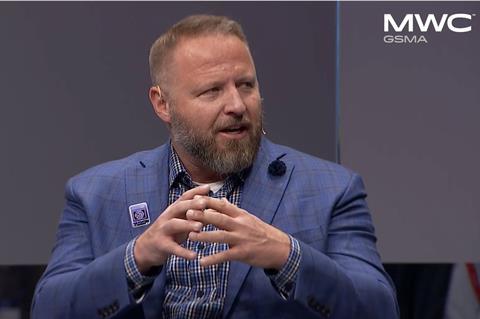
A key message from AWS during MWC was that generative AI is already proving revolutionary for the telco sector and, as AWS’s Dafna Yanay detailed in her insightful perspective on learnings from the event, it is embedded in the provider’s telecoms‑focused services on all fronts with use cases and partnerships proliferating.
In his conference panel, Chris Featherstone, Telco CX lead at AWS, highlighted the potential for generative AI in commercial operations, when digital twins come into play in two keys ways that hit key concerns of operators.
Operationally, he highlighted that generative AI is capable of bringing continued cost optimisation to operators, with even the world’s biggest operators still vulnerable to serious outages that can result in significant financial losses.
Detecting, diagnosing and fixing network problems can take a substantial amount of time, but a relatively small group of “network whisperers” can be capable of deciphering the clues and identifying root causes. Featherstone suggested that while generative AI won’t simply replace knowledge and experience, building on access to network data can be used to ask the questions that can pinpoint the source of problems, returning suggestions to address them in a fraction of the time traditionally needed.
Featherstone says that these techniques are already in play, with a broadband service provider customer of AWS reducing the time it took to remediate failures “from eight‑to‑ten hours down to three minutes”. Building on this, AI‑enabled troubleshooting is helping determine if field visits are necessary, cutting down on truck rolls and, where they are needed, powering digital assistants that can support faster fixes. “We’ve got those things implemented now, and we’re starting to see hard dollar savings across these operating costs”, he said.
A perhaps more surprising application of generative AI, building on digital twins, could be found in the field of customer experience. This has entailed AWS telco customers asking the question “what’s the impact of the network on the actual individual user?”, and considering how changes will affect the commercial side of the business. He then guides that this can enable operators to not only foresee operational impacts, but also predict corresponding customer behaviour and identify appropriate commercial response. This can be automated, too, helping to “actually keep them as [a] customer” in the event of a necessary disruption.
Featherstone’s enthusiasm for generative AI was also evident in the AWS stand, with operator use cases to the fore, with T‑Mobile and TELUS among the operators using the technology for operational optimisation.
AWS at MWC24: capturing that buzz of transformation in action
In a personal reflection on MWC24, AWS Head of Telecom Marketing Dafna Yanay highlights an underlying message of tangible progress that permeated the latest MWC. With examples tying into tangible AWS collaborations, Dafna considers how cloud networks are making strides across the enterprise and consumer segments of the industry, with generative AI a thread pulling strands of innovation together.AWS has the API know‑how to accelerate NaaS opportunity
Network APIs were a major topic of conversation across MWC, and AWS is making a major play for a key role in the development of the segment.
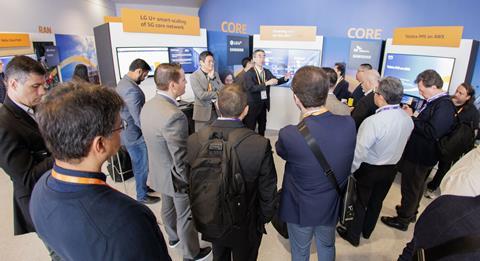
As an enthusiastic backer of the GSMA’s Open Gateway initiative, AWS flagged its involvement in the introduction of the SInergiAPI platform to be leveraged in Indonesia by the country’s operators securing digital identity for fintech applications.
AWS has also already seen considerable success with Europe’s Liberty Global. The pair recently signed a Network-as-a‑Service framework agreement, founded on work on network APIs at VodafoneZiggo, and both were involved in Unmanned Life’s GSMA award‑winning autonomous drone orchestration platform.
The cloud platform provider has also tied with Vonage to widen the scope of network APIs made available to the developer community, with fraud protection solutions from the Ericsson‑owned business available through its marketplace.
Although rapid progress has been seen with network APIs since Open Gateway launched at last year’s MWC, it is still early days.
Dr Ishwar Parulkar, AWS’s CTO for Telecom, offered reassurance on the path being taken, considering tightly focused early API development to be a vital tool for long‑term success.
Speaking during the Gateway to API Heaven conference session, he suggested that “To get developer adoption, you want a small critical mass of APIs that everybody agrees are the ones to go out first, which will create a significant enough footprint for this to take off”, adding, “then you have enough room and space to differentiate”.
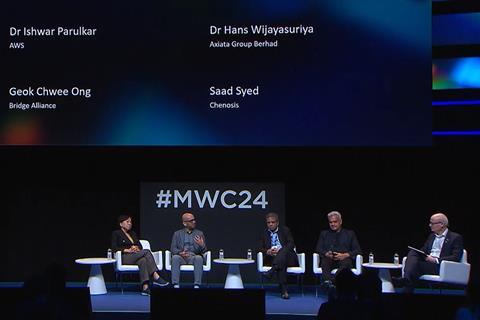
Looking ahead, though, Parulkar encourages operators to adopt a different mindset, seeing network APIs as a shining example of the different world telcos are coming into. “We release these things on a daily basis in the cloud world. It’s software. You can put it out. If it works, it’ll catch fire. If it doesn’t, it doesn’t… Just try them out, get them in the hands of the developers”.
He also positions AWS as a source of knowledge on managing commercial relationships with developers. Having already made thousands of APIs available, AWS has acquired “lots of learnings in terms of how developers consumer [them]”, such as what they will, and will not, pay for.
Parulkar advises that establishing a clear framework for network API commercialisation, effectively aligned across the telco community, will be crucial, and he notes that AWS has insights into what might work here, too.
Showing telcos the money — AWS pinpoints vertical opportunities
A key element of AWS’s pitch to the telecoms community at MWC was the support it can provide to operators seeking to leverage investment in next‑generation networks through a new wave of enterprise‑focused services.
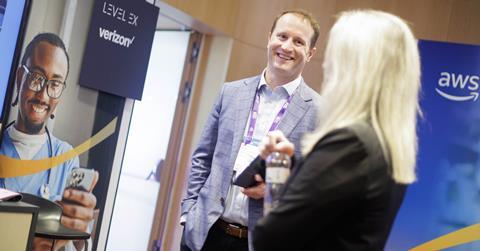
Here, AWS is positioning itself as both enabler and conduit for collaboration with software vendors, bringing together partners to create monetisable solutions that intrinsically feature network services. As well as fostering innovative ideas, this approach can be seen addressing longstanding telco concerns regarding the risk of becoming mere resellers in the digital world, and not unlocking the value in the networks they provide.
AWS brings its own strengths in mobile edge computing to the development of private network use cases that are promising to be breakthroughs for operators in several verticals. It is able to showcase new ways of monetising investment in private 5G for the currently‑hot vertical of ports, through a link‑up with innovative charging platform Totogi in support of Verizon, while a standout demo at the AWS stand, also highlighted by Dafna Yanay in her reflections on MWC, was on the impact of a partnership between Accenture, Ericsson, Verizon and AWS to deliver smart defect detection to manufacturer Jabil, which was also held up as validation of the AWS collaborative strategy.
AWS tackled the question of whether digital investment in the manufacturing vertical is worth the effort on the panel Is your dream Smart Factory worth the cost?.
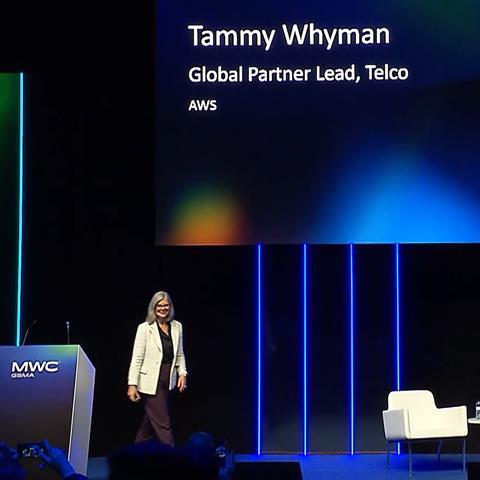
Here, Tammy Whyman, AWS’s Global Partner Lead for Telco, outlined the challenges common across projects in the field, with siloed data and systems, and varying localised priorities creating obstacles to overarching goals.
She was able to take a step back, and emphasise how as data converges on the cloud, many of these current issues can be tackled. Data, she noted, “is a great place to start a partnership”, and with collaboration comes the opportunity for greater clarity, which in turn will help identify the financial and performance benefits of the smart factory.
Partners highlighted by Whyman included T‑Systems, with which AWS also worked on a manufacturing project. Together, a solution drawing on edge computing power, machine learning and mobile devices was able to deliver high levels of confidence in identifying and classifying potential defects for a sector client.
This is now not only being scaled up by the client, but is set to be commercialised as a new industry solution by AWS and T‑Systems, underlining the expanding monetisable opportunities that are snowballing as innovation is applied across industry.
Industry digitisation opening up crossover monetisation for telcos
AWS is highlighting its ability to work with operators across industry verticals to support monetisation of network investment, with a number signposted at MWC for their crossover appeal:• Agriculture.
• Airports/Travel.
• Financial services.
• Healthcare.
• Manufacturing.
• Media & Entertainment.
• Ports.
The revolution will be cloudified
Another key theme for AWS at MWC was the role it is increasingly playing as networks become virtualised and the cloud becomes a viable location for critical functions that are at the heart of telco’s infrastructure.
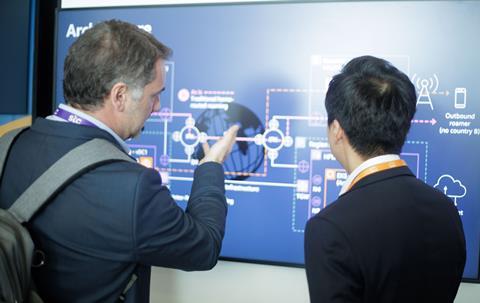
As seen above, this creates the opportunity to open up these functions through developments such as network APIs that are paving the way for a Network‑as‑a-Service future.
AWS was also able to illustrate how this future could evolve through use cases that spotlit its presence from the core to the RAN, and all systems and platforms surrounding them.
Adding to this were a swathe of announcements of operator partnerships, at and around MWC, covering AWS involvement in supporting their practical moves towards meaningful network cloudification, and demonstrating that AWS in Telecom is committed for the long‑haul.
Selected AWS telco partnership activity in and around MWC24
| Operator | Geography | Focus | Highlights |
|---|---|---|---|
|
AI-RAN Alliance |
Global |
• RAN • AI |
AWS joined T-Mobile US and SoftBank amongst founder members of the AI-RAN Alliance. |
|
BT |
UK |
• Generative AI |
BT confirmed deployment of Amazon CodeWhisperer from AWS, revealing significant automation and efficiency gains for its software developers. |
|
CelcomDigi |
Malaysia |
• Generative AI |
CelcomDigi and AWS sealed a generative AI co-creation partnership at MWC24. |
|
Du |
UAE |
• Sovereign cloud • Transformation |
Partnership to advance cloud adoption by enterprises and government, encompassing IoT, AI, ML and segment-specific solutions. Establishment of sovereign cloud capabilities. Du is also working with AWS on its digital transformation, including customer experience and generative AI. |
|
e& |
UAE |
• Generative AI |
e& UAE is partnering AWS, including Bedrock and SageMaker, to enhance customer interaction. |
|
e& |
Egypt |
• Cloud • Transformation • Generative AI • Analytics |
e& Egypt announced at MWC24 its IT modernisation collaboration with AWS, encompassing cloud and enhancement for consumer and business customers, including AWS Outpost s. |
|
Government |
Paraguay |
• Partnership • Investment |
Paraguay’s President Santiago Peña is reported to have met AWS and other industry players at MWC to discuss partnership and investment opportunities, including potential to leverage clean energy. |
|
GSMA |
Global |
• Network API |
AWS credited as a key partner for the GSMA’s Open Gateway network API initiative, which has now seen commercial launches with 47 mobile groups that together account for 239 mobile networks and 65% of subscribers worldwide. 94 APIs have now been made available. |
|
KT |
South Korea |
• Generative AI • Cloud • 5G |
Generative AI and mobile partnership to build new mobile services, with AWS Bedrock. |
|
KT |
South Korea |
• Private mobile networks |
Availability of IPW 5G private mobile network services via AWS. |
|
LG Uplus |
South Korea |
• Generative AI |
Employing AWS Bedrock to offer API-based AI foundation models as a service. |
|
Liberty Global |
Europe |
• Network API |
Multi-market European telecoms group Liberty Group is partnering AWS to develop a consumer and enterprise Network-as-a-Service framework, extending network APIs to developers. |
|
Maxis |
Malaysia |
• Generative AI • 5G |
Development of enterprise generative AI and 5G use cases, including customer experience. |
|
NTT DOCOMO |
Japan |
• 5G • ORAN • Core |
DOCOMO employing AWS cloud for its nationwide 5G ORAN network, including energy-efficient Core. AWS joins DOCOMO’s OREX global ORAN initiative. |
|
Omantel |
Oman |
• Sovereign cloud • Transformation |
Creation of sovereign cloud capabilities, including for government and regulated industries. Collaboration on a Cloud Centre of Excellence. AWS confirmed as preferred cloud partner for Omantel digital transformation. |
|
Telstra |
Australia |
• Network |
Telstra is testing the resilience of a hybrid network architecture with Nokia and AWS, including IP multimedia subsystem and cloud. |
|
TELUS |
North America Worldwide |
• Virtual Roaming |
Canada’s TELUS is collaborating with AWS and Samsung to debut North America’s first virtual roaming gateway, hosted via AWS Regions worldwide. |
|
Virgin Mobile |
Latin America |
• Cloud • Transformation |
Beyond ONE, representing Virgin Mobile in Latin America, confirmed at MWC24 that AWS will be supporting its cloud, modernisation, and digital transformation initiatives. |
|
Vodafone |
Ireland |
• Cloud |
AWS is the cloud provider for Vodafone Ireland’s modernised B2B platform developed by Celfocus. |
Sources: Companies, media, TelcoTitans, February to early-March 2024.
Topics
- 5G
- AI (artificial intelligence, machine learning)
- API
- AWS (Amazon Web Services)
- BT Group
- CelcomDigi
- Chivas Nambiar
- Chris Featherstone
- Clint Crosier
- Cloud
- Dafna Yanay
- Digital twins
- DOCOMO
- Du
- e& (Etisalat)
- Edge computing (MEC)
- Ericsson
- Events
- Eventwatch
- GSMA (GSM Association)
- Industry 4.0
- Ishwar Parulkar
- LG Uplus (LG U+)
- Liberty Global
- Maxis
- Mobile World Congress (MWC)
- NaaS (Network-as-a-Service)
- Omantel
- Open Gateway (API)
- Open RAN (ORAN)
- Partnerships & Alliances
- Satellite
- Telstra
- Telus
- Transformation (change)
- Unmanned Life
- Virgin Mobile (international VMNO brand)
- Vodafone Group
- VodafoneZiggo (Netherlands)

